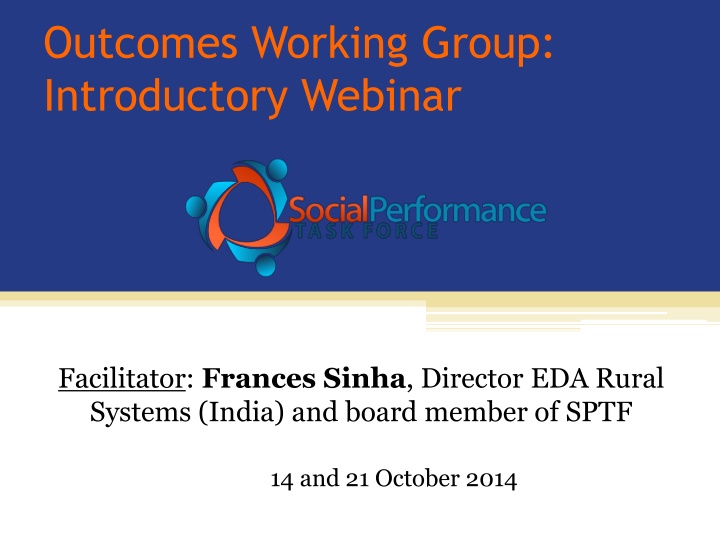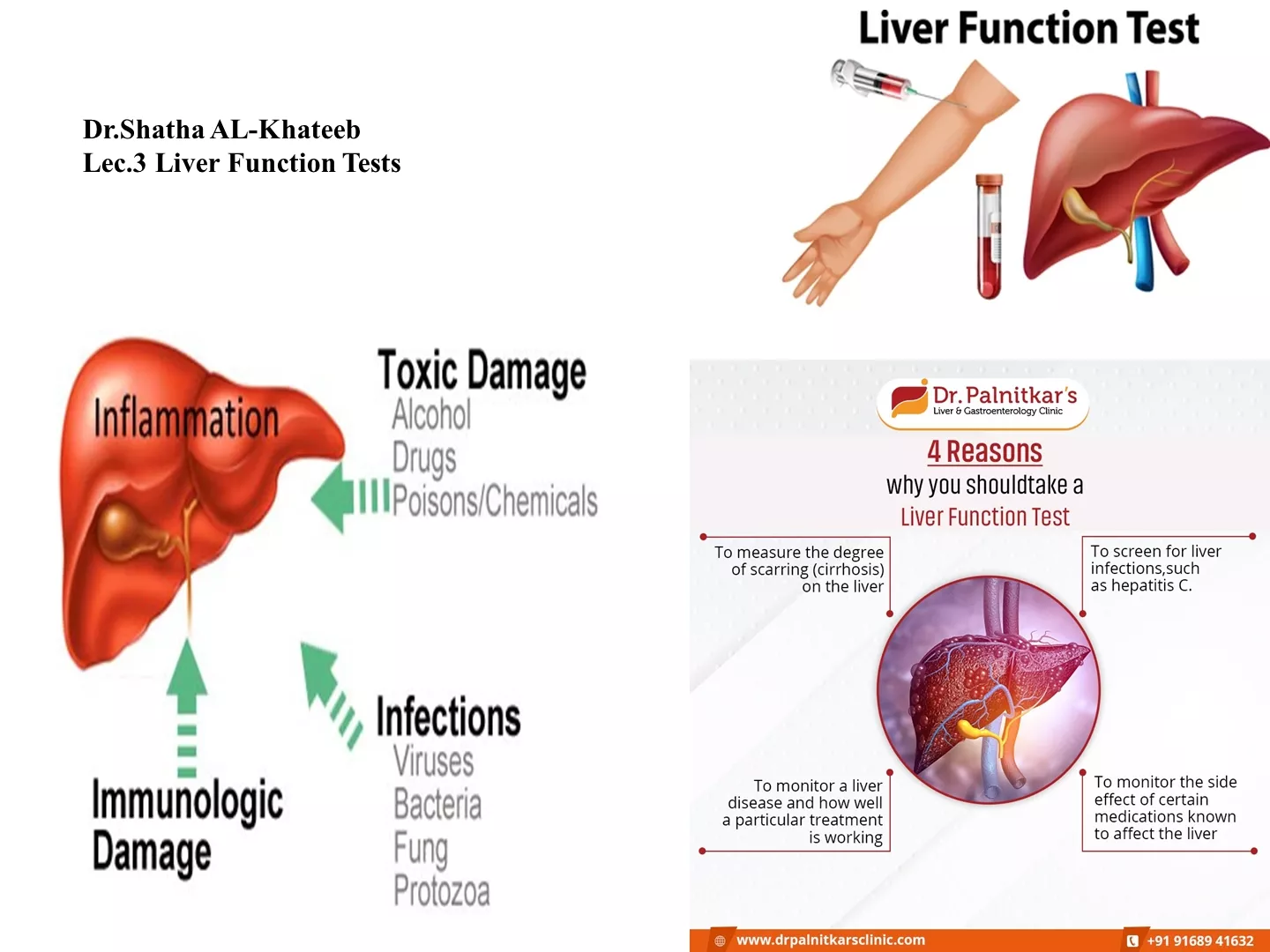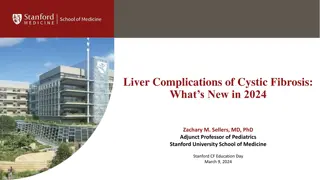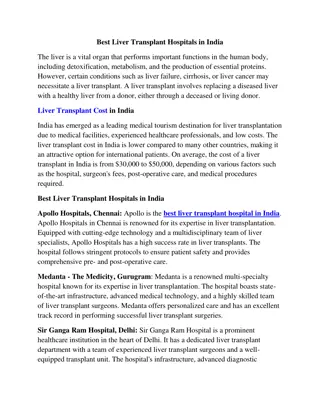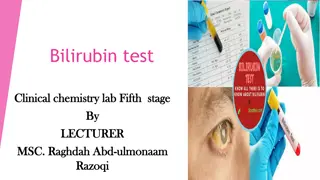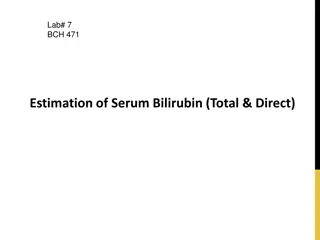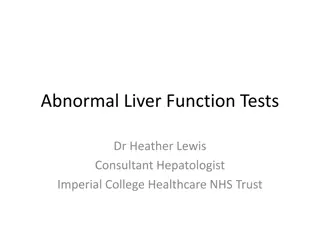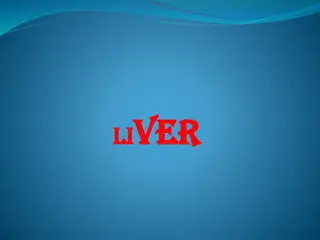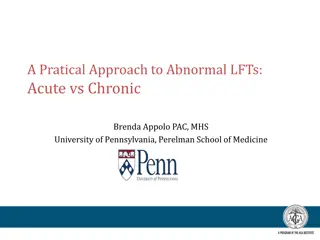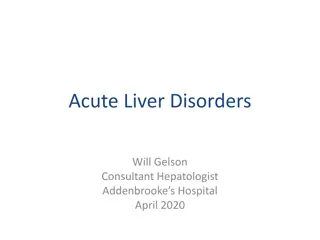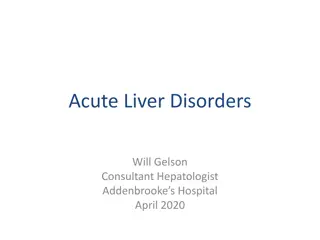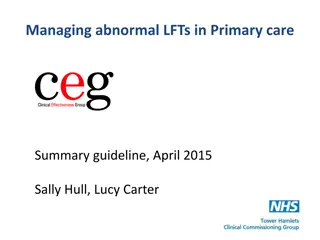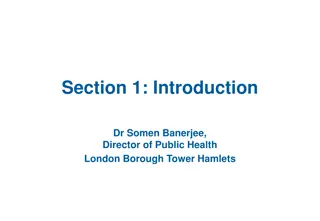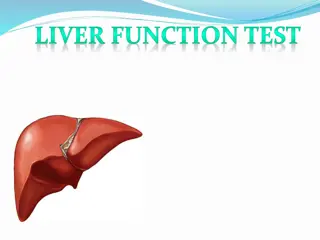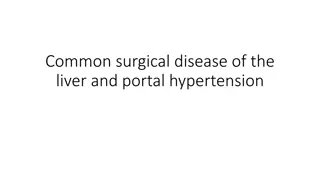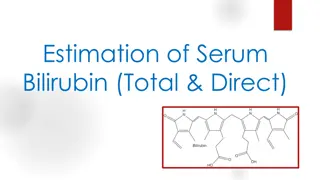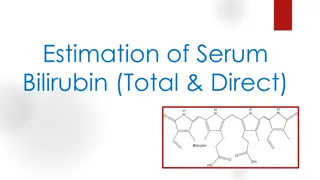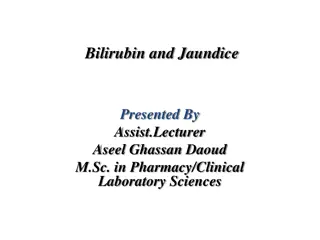Liver Function Tests - Understanding Bilirubin Biochemistry
Liver function tests (LFTs) play a vital role in assessing liver health. Explore the significance of bilirubin in the body, its production, transportation to the liver, conjugation process, and associated syndromes. Dive into the biochemical aspects of total bilirubin measurement and gain insights into liver function test interpretations.
Download Presentation

Please find below an Image/Link to download the presentation.
The content on the website is provided AS IS for your information and personal use only. It may not be sold, licensed, or shared on other websites without obtaining consent from the author.If you encounter any issues during the download, it is possible that the publisher has removed the file from their server.
You are allowed to download the files provided on this website for personal or commercial use, subject to the condition that they are used lawfully. All files are the property of their respective owners.
The content on the website is provided AS IS for your information and personal use only. It may not be sold, licensed, or shared on other websites without obtaining consent from the author.
E N D
Presentation Transcript
Outcomes Working Group: Introductory Webinar Facilitator: Frances Sinha, Director EDA Rural Systems (India) and board member of SPTF 14 and 21 October 2014
Agenda Context what do we know already, what are the concerns? DISCUSSION/EXPERIENCE SHARING Purpose of this working group Planning o Structure of Working Group o Areas of activity: preliminary ideas DISCUSSION - NEXT STEPS
Dakar, June: It is important that our sector improves its measurement of client outcomes Essential to the goal of creating benefits for clients Impact investors would like to see evidence of positive change Measuring outcomes, is not only about proving, more fundamentally it can help to improve performance Communication of outcomes improves reputation of the sector
Communication of outcomes improves reputation of the sector Has it? The opposite may have happened - RCTs have undermined the reputation of microfinance for poverty alleviation and women s empowerment Other studies their reputation in terms of methodology is questioned What lessons are there what can we build on?
Reviewing experiences There are issues and lessons around CREDIBILITY and COSTS Resources/Skills
We need CREDIBILITY x 3 1 Credibility in what we measure Realistic expectations of what microfinance can achieve Understand a theory of change depending on the inputs,. i.e varying use of different financial services (for smoothing consumption, growing enterprises, managing risks, building assets) Recognise micro nature of the inputs And think about how long it takes: shorter term use (1-2 years) vs longer term (Maybe 5 yrs + ...)
2 Credibility in how we measure Choice of method and tools Whether quantitative or qualitative issues of Quality of data Any sampling should be representative
3 Credibility in analysis, reporting Analysis should include different starting points, and contexts as well as inputs ... and differences in findings, not just the average: we can learn from those above the average and those below. Short, clear reporting: data that has relevance, focused tables/graphs, conclusions and implications
Purpose of Outcomes Working Group To develop practical guidelines for credible measurement and reporting of outcomes, drawing on experience with different approaches and tools.
What do we mean by....? CREDIBLE MEASUREMENT & REPORTING ANSWERS THE KEY QUESTIONS PRACTICAL TO IMPLEMENT AT REASONABLE COST RELIABLE CLEAR INSIGHTS AN END 2 END PROCESS mirroring SPM (next slide)
Social Impact investm ent Task Force WG White Paper Measuring Impact September 2014
SPTF Working Group on Outcomes: Fit with current thinking TOPICAL A lot is happening CGAP, Microcredit Summit Campaign, Grameen Foundation, Truelift, Freedom From Hunger, Systematic Reviews researchers, academics [Resources....] Practitioners and investors are interested many have tried different approaches We aim to draw out the key lessons the how to with practical examples Not only tools but an end2 end process; links into process details in the USSPM Usable results
What do we mean by....? APPROACHES AND TOOLS RANGE OF OPTIONS TO CONSIDER: o QUANT - QUAL o ONGOING MONITORING PERIODIC WHICH IS THE RIGHT CHOICE OR COMBINATION IN RELATION TO QUESTIONS AND RESOURCES? WHO IMPLEMENTS PRACTITIONER? EXTERNAL? WHAT ARE THE COSTS INVOLVED
Existing practices - tools MIS - Portfolio tracking Loan size distribution by cycle Graduation from group to individual Savings over time Household characteristics collected at entry, (baseline) and after x years (endline); includes e.g. PPI/PAT + relevant indicators Baseline - endline Capture household characteristics, PPI/PAT+ With/without control of non-clients With/without randomisation + questions of self perception/ladder Client feedback/opinion; Client meetings Staff feedback Stories in depth MIS - routine client level data Sample surveys Focus groups Case studies
ROBUST & CLEAR Anecdotal Challenges across the spectrum Examples of issues at both ends of the spectrum: Case studies good to understand complex reality, process of change; weak when only focus on success stories; and lack systematic analysis (of why... how.. who... when....) RCTs method limits period within which to track change; and often control of non-clients have some access to semi-formal financial services; better for short-term evaluation of a specific approach, rather than answering broader, longer- term questions All need reporting that is interesting and useful
Some key issues Outcomes rather than impact - short-term outcomes linked to use of services - consider if and when it is useful and feasible to attribute causality (requires non-client control sample) Important to put a baseline in place - alternatives are less robust (recall, cross-sections) Details matter differences in context/clients, differences in inputs and results, including dropouts (segmentation) Options for practitioner involvement field staff (routine data collection), own R&D external advisory, external commissioned study Costs practicality utility of results division,
DISCUSSION Questions to you: 1 Would you like to share what you are already doing to measure outcomes ? Or your investees? 2 What questions, concerns do you have? 3 What can we add as a Working Group of the SPTF to what is already happening?
Structure of Outcomes Working Group Members: open to all practitioners, networks, TA providers, investors, consultants Subject matter specialists/advisors practical academics Link with SPTF investors outcomes committee
Ideas for Areas of Activity i. Specify the outcome questions linked to theory of change/inputs ii. Explore and prioritise the approaches and tools to address these questions iii. Document specific examples/experiences of useful/robust application of relevant tools iv. Generate clear, practical guidelines - all elements of the end2end process
Process for the Working Group opportunities to submit comments or questions over email option - sub-groups: expertise on specific aspects or approaches/tools virtual meetings in WebEx (at least one a quarter possibly more): presentations of good examples panel reviews
Next steps thoughts.... Pick a specific issue or type of approach/tool to present and discuss in more detail at the next meeting Invite a speaker to share at the next meeting what his/her institution is doing specifically on outcomes, the challenges involved, insights on how to address or further questions Panel discussion to review good examples of tools/approaches, recommendations to balance credibility and affordability
DISCUSSION Questions to you 1 Do you have suggestions on proposed approach, options for next steps, specific issues or examples to review? 2 Would you like to volunteer? Now or follow up by email
Thank you For follow up, please contact: info@sptf.info Please note that the presentations and recordings from all Outcomes Working Group Meetings will be posted to the SPTF website, on the working groups page: http://sptf.info/sp- task-force/working-groups
